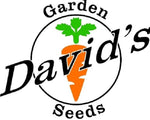Safe Seed Pledge Is Now Updated To Seed Integrity Pledge 11/24/2024
Have you heard of the Safe Seed Pledge? David's Garden Seeds® wants our loyal customers to know that we have taken this important Pledge. This pledge was created in 1999 by ten different seed companies to take a stand against genetically engineered seeds.
God created the food chain, including plants with seeds. His way is best so we are going with the seeds he created, not genetically modified seeds.
We do not want to sell any seeds that are genetically modified so we decided, along with many other seed companies, to take the pledge below to protect our seeds.
The Safe Seed Pledge
"Agriculture and seeds provide the basis upon which our lives depend. We must protect this foundation as a safe and genetically stable source for future generations. For the benefit of all farmers, gardeners and consumers who want an alternative, we pledge that we do not knowingly buy or sell genetically engineered seeds or plants.
"The mechanical transfer of genetic material outside of natural reproductive methods and between genera, families or kingdoms poses great biological risks, as well as economic, political and cultural threats. We feel that genetically engineered varieties have been insufficiently tested prior to public release.
"More research and testing is necessary to further assess the potential risks of genetically engineered seeds. Further, we wish to support agricultural progress that leads to healthier soils, genetically diverse agricultural ecosystems and ultimately healthy people and communities."
Take the Safe Seed Pledge
We at David's Garden Seeds® took the Safe Seed Pledge on January 24, 2009. We provide seeds that are safe for growing food. We plant them, grow food and feed our family from our backyard garden. We would never sell anything that we would not grow and eat ourselves.
Another name for the Genetically Modified Seeds is to call them GMOs. Many companies are using this as a sales pitch on many products now in order to sell them. I have see some of the products that say Non-GMO on them. The problem I have is it is a food that is not used in GMO production to begin with.
To begin with there are only two vegetables that have GMO varieties: Some corn and squash types. The way the grocery stores make it sound is all products could contain GMOs. This is just not true.
And something else I have seen--there are companies claiming that certain products are organic but they have a ton of preservatives in them. The preservatives are not organic, in most cases. Anyway, don't take the grocery store's word. Do your own homework.
Something else to watch our for: Some seed companies claim that this seed or that one is heirloom, and yet when you get to digging around you find out it was just developed in the last few years. They even claim that some hybrids are heirlooms. This just isn't so.
UPDATE ON THE SAFE SEED PLEDGE - November 27, 2024
This morning, we opened an email with an update to the Safe Seed Pledge, asking us to sign the new Seed Integrity Pledge. We signed it and were happy to do so.
Last year, the FDA approved the first GMO tomato for home consumer use and it started selling in January of 2024. You can read about that on the Mrs. David's Garden Seeds blog. Now more GMOs available for home use have been approved and it is getting worse. Instead of just one genetically modified gene, they are approving up to 12 modifications on one plant.
Here is the new pledge that we signed:
Seeds are essential for the provision of healthy food, our well-being, and that of our environment and planet. We must protect the diversity and genetic integrity of our seeds to provide the foundation for a stable, safe food supply for us and for generations to come.
The mechanical alteration of genetic material outside of natural reproductive methods within or between genera, families or kingdoms, poses great biological risks as well as environmental, economic, political, and cultural threats.
New methods of genetic engineering such as CRISPR and other genome editing or gene silencing technologies are touted as precise and safe by the biotech industry. Independent studies, however, document the same risks of off-target and unintended changes to the organism as older genetic engineering methods. Yet, the U.S. and other governments have declined to regulate organisms produced with newer genetic engineering technologies (also known as New Genomic Techniques or NGTs) and no safety testing is required prior to their release.
An ever-increasing number of organisms are being genetically altered in labs and are quietly making their way into our gardens, farms, and food supply. The increased pace of commercialization of whole foods that are directly eaten by consumers such as salad greens, tomatoes, potatoes, mushrooms, pineapples, apples, bananas, and chestnuts, as well as flowers such as pollinator-favorite petunias, increases the urgency of protecting the genetic integrity of our seeds.
We wish to support agricultural progress that leads to healthier soils, genetically stable and diverse agricultural ecosystems, and ultimately people and communities.
For the benefit of all farmers, gardeners, and consumers, we pledge that we do not knowingly buy, sell, or trade genetically engineered seeds or plants created using transgenic, cisgenic, RNAi, CRISPR/cas9 or any other genetic engineering technology.







Once again. Truth is published and informative. You filter out all the confusing gibberish and provide us, the regular, local folks with facts and information we can use locally.
Leave a comment